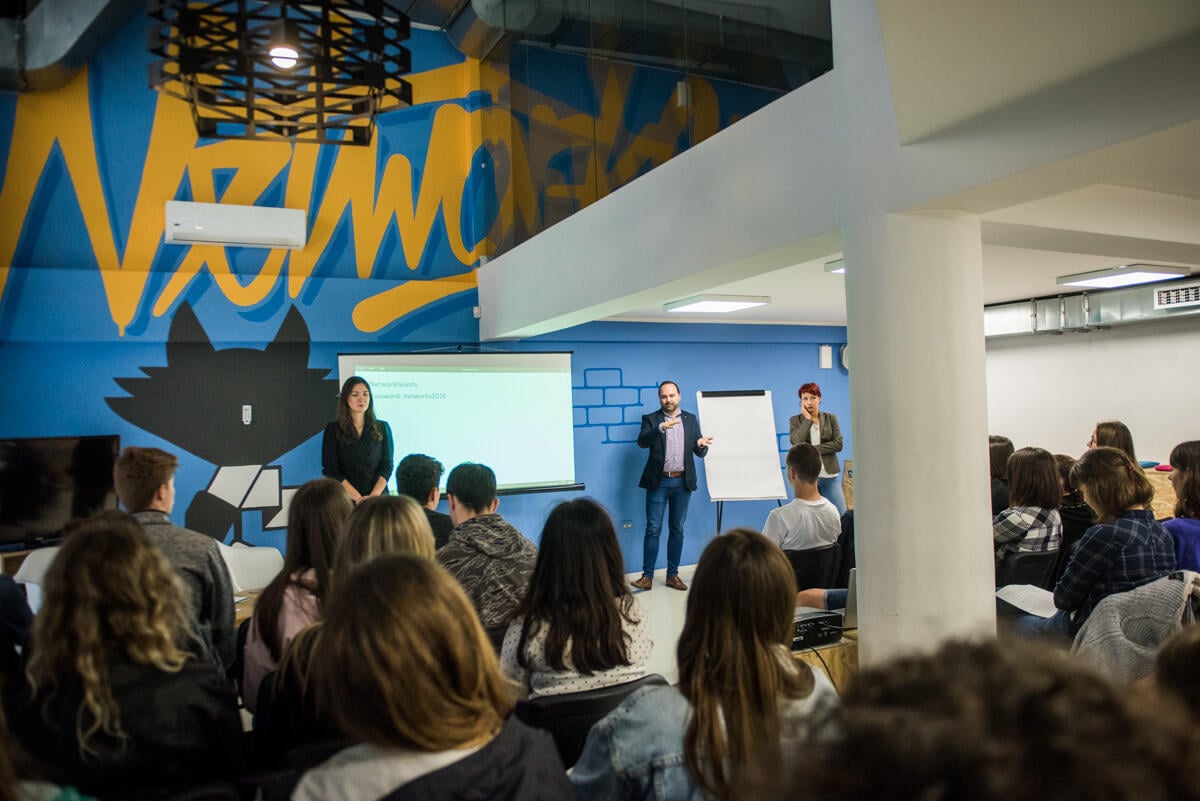Mostar Summer Youth Programme – MSYP is being held fifth year in a row, and this time in cooperation with United Nations Population Fund (UNFPA) and International Organization for Migration, UN Agency for Migration (IOM). This three week programme provides the opportunity for young people to learn about the issues and topics outside the formal education system. Apart from this, the program offers the chance to perfect their English and to network with international lecturers.
„Nobody could presume that the project which started five years ago with only three students would become this important to Mostar and that it would bring together young people from every part of Mostar.“ Says Dario Lončarević, one of the Program Coordinators
During three weeks of the program, young people engage in workshops about various topics through which they acquire knowledge unavailable to them through formal education and everyday life.
Dario continues: „There are workshops about political activities, arts, social activism and after second or even third week of the project we implement tailor made workshops based on individual preferences of the participants on various topics such as architecture, feminism, women position in society, etc. Every perticipant comes to the program with a goal of becoming better version of themselves, strengthen their capacities and learn new skills and values.“
United Nations Population Fund and International Organization for Migration, UN Agency for Migration are focusing on supporting young leaders who fight the negative influences in society, and who work on reducing the stigma and discrimination of persons who survived sexual violence during conflict through their projects.
"We believe that we all bear responsibility for creating an inclusive, tolerant society that does not condemn, but supports, and transforms inherited traumas of the past," said Samid Šarenkapic (UNFPA), adding: "We truly believe that young people have the strength, capacity and innovativeness to help society to provide survivors with the opportunity to continue their lives free from trauma, stigma and discrimination."
Throught the work in local communities IOM seeks to enable young people to directly influence changes in society and in said local communities. By improving and strengthening personal capacities, young people also strengthen their networks with political representatives at their local communities.
In words of Kristina Šešlija, IOM Grants Manager: "Young people need to be creators of ideas that are really necessary and should be empowered to initiate and implement their ideas in cooperation with their local communities, this is what we, as IOM, have been focusing on in the previous period and we continuously support young people throughout BiH.“
Dynamic and interactive work
All MSYP lectures are interactive, and participants have the freedom to express their opinions and knowledge through joint projects and performances. This approach to education is more effective than the formal educational system that young people from Mostar are encountering, which is visible through their feedback.
Fifteen-year-old Luka Maric says that he is delighted with the possibilities offered by MSYP: "Learning experience within a diverse group is different. Some things are easier to comprehend and the learning is easier and more fun." said Luka, a first time participant of MSYP.
Topics discussed through this project are connected to everyday problems of society, and MSYP encourages and motivates young people to continue their learning process and focus on activism in society.
“Some of the issues we discussed in schools were only partially and superficially covered, here we had a chance to think deeper and speak out loud. I believe that MSYP will bring me closer to other people and motivate me to think openly which will be beneficial for my engagement in various activities” said Džejna Hurto (18), a high school student from Mostar.
About 70 young people from all parts of Mostar had the opportunity to visit Sarajevo, the capital of Bosnia and Herzegovina for the first time, where they talked about the stigmatization and discrimination with the representatives of UNFPA and IOM. Their arrival to Sarajevo included a tour of the city involving a visit to sites such as the City Hall and the Museum of War Childhood.
UNFPA and IOM supported this visit to Sarajevo, recognizing the importance of this program aimed at building a community and providing opportunities for young people to become leaders of tomorrow and agents of positive social changes.
By Nejra Dzabija


